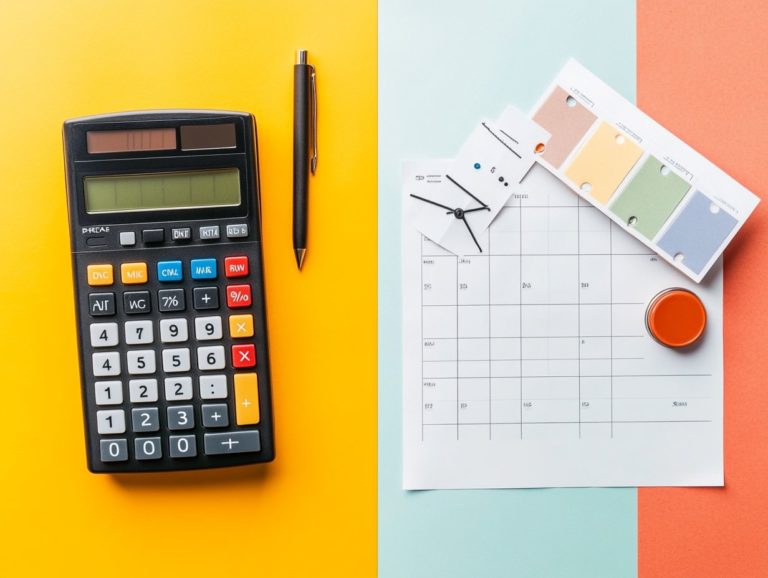How Can I Use Budgeting to Help with Impulse Spending?
Impulse spending can catch anyone off guard, often leading to financial regret and stress. Recognizing what sparks spontaneous purchases is the crucial first step to regaining control over your finances.
This article explores the ins and outs of impulse spending and highlights the important role budgeting plays in managing it effectively. You will also discover strategies to help stop spontaneous spending.
Additionally, we’ll discuss how simple adjustments can pave the way for improved financial health and a greater sense of peace of mind.
Contents
- Key Takeaways:
- Understanding Impulse Spending
- The Importance of Budgeting
- Creating a Budget
- Tracking and Evaluating Expenses
- Identifying and Addressing Triggers
- Alternative Strategies for Managing Impulse Spending
- Frequently Asked Questions
- How Can I Use Budgeting to Help with Impulse Spending?
- What is impulse spending?
- How does budgeting help with impulse spending?
- What are some budgeting techniques to help with impulse spending?
- Can budgeting completely eliminate impulse spending?
- Can I still treat myself while using budgeting to control impulse spending?
- What are some other benefits of using budgeting to control impulse spending?
Key Takeaways:

- Impulse spending can lead to financial stress and poor decision-making.
- Budgeting is a powerful tool to help control and reduce impulse spending.
- Create a personal budget, track your expenses, and identify triggers to manage impulse spending effectively.
Understanding Impulse Spending
Impulse spending refers to those unplanned purchases you make, often driven by feelings that prompt spending rather than rational thought. This behavior can seriously derail your financial dreams, so it’s crucial to address it now!
Many people engage in shopping to feel better, using it to cope with stress or anxiety especially during challenging times like the COVID-19 pandemic. Such habits can result in excessive impulse purchases that disrupt your budget and savings efforts.
Understanding how we think about spending is key to taking control of your financial landscape.
Defining Impulse Spending and its Effects
Impulse spending refers to unplanned purchases swayed by emotional impulses and the lure of immediate gratification, which can throw a wrench in your financial goals.
This behavior often occurs when you encounter enticing promotional offers or are swept up in emotions like sadness, excitement, or stress, leading you to buy things you don t need. The consequences can be significant, leading to budget imbalances and stalled savings. Emotional spending often results in splurging on luxury items or accumulating unnecessary debt to soothe those feelings.
Recognizing the patterns of impulse spending is crucial for developing effective budgeting strategies and maintaining the financial discipline necessary for long-term success.
The Importance of Budgeting
You need budgeting to manage your personal finances effectively. It serves as a roadmap for navigating your financial landscape, setting your financial goals, and maintaining effective spending limits.
A well-designed budget enables you to make informed purchasing decisions, steering clear of the traps of impulse buying and emotional spending.
With a clear budget in hand, you can cultivate accountability and develop positive shopping habits, helping you choose retail therapy wisely while staying within your financial boundaries.
How Budgeting Can Help with Impulse Spending
Effective budgeting helps you manage impulse purchases by setting clear spending limits and structuring your shopping list while recognizing the emotional triggers that lead to unplanned expenditures. For more insights, check out how budgeting can help with major purchases.
By using budgeting tools, you can gain insights into your spending habits and identify when you’re most vulnerable to impulsive buys. For instance, using budgeting to reduce financial anxiety by crafting a shopping list before going to the store helps keep you focused on what you truly need and reduces the temptation to add unplanned items.
Understanding your emotional triggers like stress or boredom can help you develop healthier coping strategies, such as taking a walk or practicing mindfulness instead of reaching for your wallet.
Real-life examples abound, such as individuals who limit their shopping trips to just once a month, showcasing how these strategies can build discipline and ultimately lead to significant savings.
Start budgeting today to reclaim your financial freedom!
Creating a Budget

Creating a budget is an essential step toward achieving your financial goals! Assessing your income, expenses, and savings is key to taking charge of your finances.
Try using budgeting apps or exploring techniques like the no-spend challenge a commitment to avoid non-essential purchases for a set period to foster discipline and accountability in your financial journey.
Steps to Creating a Personal Budget
Creating a personal budget involves several key steps that can transform your financial landscape. Start by defining your financial goals and establishing spending limits.
Commit to regular reviews and adjustments, preferably with the support of an accountability group or effective budgeting tools.
The journey begins with a thorough assessment of your income. Identify all your sources of revenue, ensuring every dollar is accounted for.
Next, tracking your expenses becomes crucial. Document your purchases whether they re fixed costs or discretionary spending. This will give you a clearer understanding of your habits.
Once you’ve completed these initial phases, set realistic financial goals. Whether that’s saving for a dream vacation, paying off debt, or investing for future growth, maintaining this structure requires accountability.
Choose a budgeting app or a supportive group, and conduct regular check-ins to keep you motivated and your financial journey on track. This will allow for adjustments as needed to ensure long-term success.
Tracking and Evaluating Expenses
Tracking and evaluating your expenses is crucial for maintaining a budget. It helps you stay aligned with your financial goals and keeps you informed about your spending habits.
Try using budgeting apps to enhance your tracking capabilities, making the process even more streamlined and effective.
Methods for Tracking Expenses
There are several effective methods for tracking your expenses, such as using budgeting apps, spreadsheets, or maintaining a detailed spending log. These tools will help you stick to your spending limits.
Each method offers distinct advantages, providing deeper insights into your financial habits. Budgeting apps come with user-friendly interfaces and automated reminder systems, making it easy to stay on top of your finances.
Spreadsheets allow for customizable categories tailored to your preferences. If you prefer a hands-on approach, a detailed spending log encourages reflection on your purchases and consideration of necessary adjustments.
Evaluate these techniques to discover what resonates best with your lifestyle. This fosters accountability and enables you to make smarter financial choices for a secure future.
Identifying and Addressing Triggers
Identifying and addressing shopping triggers is essential for combating impulse purchases and emotional spending. Understanding these triggers helps you make more considered purchasing decisions, especially in today s social media-saturated landscape.
Common Triggers for Impulse Spending and How to Address Them

Common triggers for impulse spending often stem from emotional responses, such as stress or anxiety, along with the influence of social media. Here, influencers tout retail therapy as a solution.
You may notice environmental cues that entice spontaneous purchases. Factors like promotional sales, limited-time offers, and peer pressure can significantly prompt unplanned buying behaviors.
To counteract these tendencies, implement practical strategies. Craft a shopping list before heading to the store and set a strict budget to follow.
Cultivating mindfulness and identifying your emotional triggers allows you to pause and reflect before making impulsive decisions. Establish alerts for your budget limits and opt for a waiting period before finalizing purchases. This will help you build better financial habits fast!
Alternative Strategies for Managing Impulse Spending
Consider embracing alternative strategies to manage impulse spending effectively. You might engage in a no-spend challenge to reset your habits, allocate a specific amount of fun money for purchases you don t feel bad about, and even join an accountability group to cultivate healthier spending behaviors.
These methods can enable you to take control of your finances while still allowing room for enjoyment.
Other Techniques for Curbing Impulsive Purchases
Techniques for curbing impulsive purchases include setting clear money-saving targets, using a budgeting app to monitor your expenses, and exploring healthier alternatives to retail therapy for emotional fulfillment.
By establishing specific financial milestones, you can gain a clearer perspective on your spending habits and prioritize your needs over wants. This proactive approach enhances your accountability and provides a sense of achievement as you progress toward your goals.
Leveraging budgeting tools simplifies tracking your cash flow, making it easier to pinpoint areas where you can trim unnecessary expenses. Exploring fulfilling hobbies can also help redirect emotional triggers and build a more satisfying life without resorting to impulsive buying.
Frequently Asked Questions
How Can I Use Budgeting to Help with Impulse Spending?
Budgeting can be a powerful tool to control and reduce impulse spending. By setting financial goals and tracking your expenses, you can better understand your spending habits and make more mindful decisions. For more insights, check out these common questions about budgeting to help with impulse spending.
What is impulse spending?

Impulse spending refers to unplanned purchases made on a whim, without considering the long-term consequences. These purchases can often be unnecessary and lead to overspending and financial strain.
How does budgeting help with impulse spending?
Budgeting allows you to create a plan for your money and prioritize your spending. By setting limits and tracking your expenses, you can avoid impulsive purchases and make more intentional decisions about where your money goes.
What are some budgeting techniques to help with impulse spending?
Some effective budgeting techniques include creating a monthly budget, setting money-saving targets, tracking your expenses, and using cash instead of credit cards.
Can budgeting completely eliminate impulse spending?
While budgeting can greatly reduce impulse spending, it may not eliminate it entirely. It’s important to remember that budgeting can help manage financial stress and is a tool to help you control your spending, but it still requires discipline and self-awareness to make responsible financial decisions.
Can I still treat myself while using budgeting to control impulse spending?
Absolutely! Budgeting doesn’t mean giving up all of your spontaneous purchases. It simply means being more mindful and intentional with your spending. You can still budget for occasional treats as long as they fit within your financial plan.
What are some other benefits of using budgeting to control impulse spending?
In addition to reducing impulse spending, budgeting can also help you save more money, pay off debt, and achieve your financial goals. It can reduce stress and anxiety related to finances, as you will have a better understanding and control over your money.
Ready to take control of your finances?






